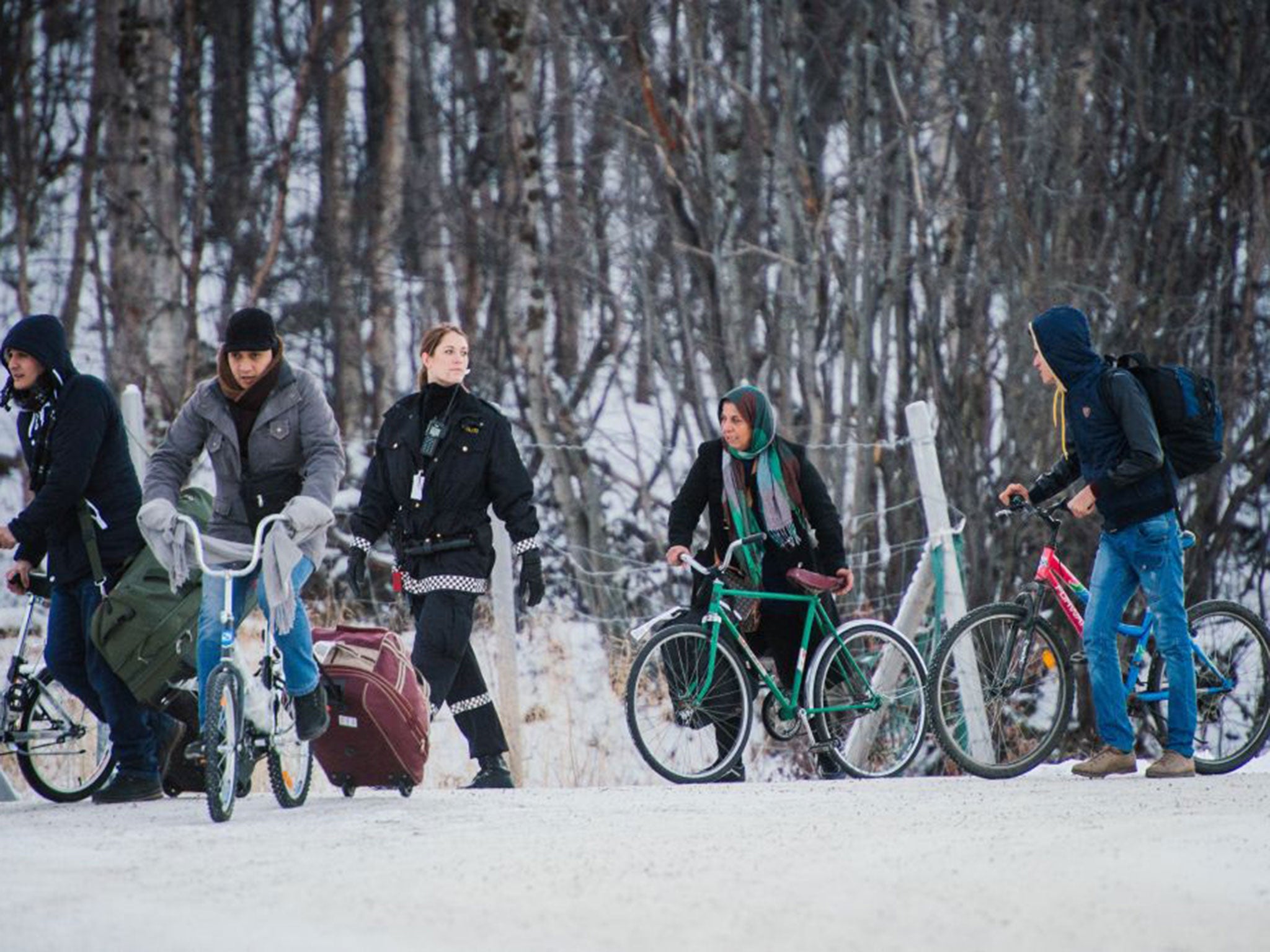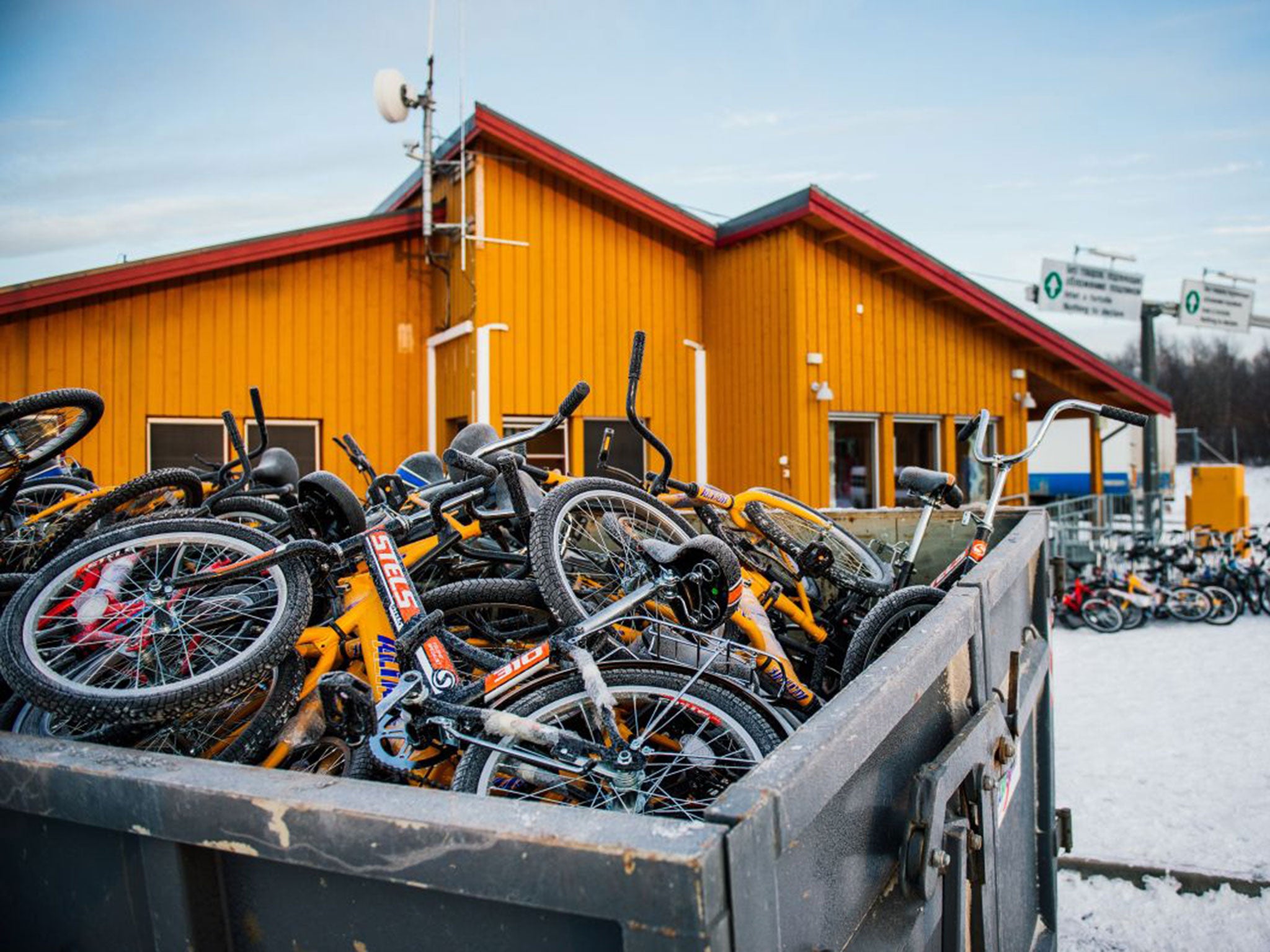Refugee crisis: Norway tells 5,500 foreigners who arrived on bikes to ride back across the border to Russia
Thousands of Syrians fleeing the conflict in their home country have been refused asylum

Your support helps us to tell the story
From reproductive rights to climate change to Big Tech, The Independent is on the ground when the story is developing. Whether it's investigating the financials of Elon Musk's pro-Trump PAC or producing our latest documentary, 'The A Word', which shines a light on the American women fighting for reproductive rights, we know how important it is to parse out the facts from the messaging.
At such a critical moment in US history, we need reporters on the ground. Your donation allows us to keep sending journalists to speak to both sides of the story.
The Independent is trusted by Americans across the entire political spectrum. And unlike many other quality news outlets, we choose not to lock Americans out of our reporting and analysis with paywalls. We believe quality journalism should be available to everyone, paid for by those who can afford it.
Your support makes all the difference.Norway is preparing to send over 5,500 refugees who crossed into the country from Russia on bicycles last year back across the border by the same mode of transport.
Police districts across Norway have been ordered to gather up and repair bikes that were abandoned by incoming refugees near the Storskog border crossing last year, after Norwegian authorities refused to grant asylum to the refugees who entered from Russia.
“We asked that the bikes which were left behind or claimed by the police to be gathered up for use by the foreigners who will be returned to Russia,” Jan Erik Thomassen, a section head from Norway’s National Police Directorate, said. “I can understand that it feels a bit awkward and odd.”
Despite the Arctic conditions this time of year, a border agreement between Russia and Norway means that bicycles have become the only way for refugees to cross from one country to the other. The agreement bars people from crossing over the border on foot and bans drivers from ferrying people into the country in their cars without documents.

Norwegian authorities said they hope Russia will allow the refugees to re-enter its Russian territory by bus, which would reduce costs and provide safer passage for those making the journey. But Russia, which has remained hostile to refugees despite the influx of migrants into Europe last year, seems unlikely to comply.
Most of the refugees who travelled to Storskog through Russia’s Arctic city of Murmansk hail from Syria. Braving sub-zero temperatures in the hopes of receiving asylum in Norway, refugees say that travelling through Russia is a cheaper alternative than other means of getting to Europe.
“To be honest, it costs much less than going to Turkey and from Turkey getting on a small, small, boat to cross to Greece, and then from Greece to Europe itself,” one Syrian refugee crossing the border from Murmansk into Norway told ABC last November.
The situation was exacerbated further in November last year, when Norway announced that it would immediately expel asylum-seekers who had originated from Russia. Moscow answered with a tit-for-tat measure, and both countries have since sent refugees back and forth.
Despite over a 60 per cent rise in the number of applicants for asylum last year – including around 12,000 Syrians – Russia’s Federal Migration Service awarded refugee status to less than 9 per cent of the total applicants.
More than a million people landed on Europe’s shores last year, with most travelling through Turkey and disembarking on Greek islands just a short – but dangerous – hop across the Aegean Sea, which can cost refugees thousands of pounds, compared with the hundreds that refugees reportedly pay for bikes to take the route across Russia.
The EU’s top migration official warned that efforts to manage the refugee crisis are failing as more countries tighten border security.
Bus-load of refugees sent to Merkel’s office
An irate local politician in the southern German state of Bavaria has dispatched a bus filled with dozens of refugees on a seven-hour journey to Chancellor Angela Merkel’s office in Berlin as a protest against her open-door policy.
A spokesman for Peter Dreier from the south-eastern town of Landshut said 31 refugees were voluntarily making the 340-mile trip to the capital.
A video on the website of the German newspaper Die Welt showed police officers shepherding dozens of men and women with bags on to a bus.
Mr Dreier appeared to be acting on a threat he made to Ms Merkel last year, critical of her policy on asylum-seekers. “If Germany is taking in one million refugees, mathematically that means 1,800 will come to my district. I will take them and if there are any more, I will send them to your office,” he said.
Mr Dreier represents the Freie Waehler, a loose grouping of politicians who campaign on mostly local issues.
Reuters
Join our commenting forum
Join thought-provoking conversations, follow other Independent readers and see their replies
Comments